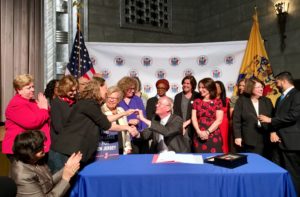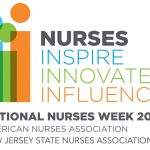NJSNA Celebrates Legislative Victory to Protect Public Health, Vulnerable Populations
Gov. Phil Murphy Signs Earned Sick Day Legislation into Law

Judith Schmidt, MSN, DHA (c) RN, CCRN and NJSNA CEO (far left, in pink), watches as Gov. Phil Murphy signs the Earned Sick and Safe Days Act into law during a ceremony at the War Memorial in Trenton.
TRENTON, N.J.—May 2, 2018—On behalf of hard-working employees, the New Jersey State Nurses Association (NJSNA) celebrated an important legislative victory today when Gov. Phil Murphy signed the Earned Sick and Safe Days Act into law during a ceremony at the War Memorial.
The legislation will give employees the ability to stay home when sick and use earned sick time to get paid, once the law goes into effect in 180 days.
Under the bill, New Jersey workers will earn one hour of sick time for every 30 hours worked, up to a maximum of 40 hours (five days) in a calendar year. These hours can be used for the employees’ illness, preventative medical care and dependent care.
“This is a huge win for the employees of New Jersey, who will no longer have to make the choice between staying home when they are sick or caring for a sick dependent,” said Judith Schmidt, MSN, DHA (c) RN, CCRN and CEO of the New Jersey State Nurses Association (NJSNA) as she witnessed the signing. “Staying home when sick—both adults and children—is essential for public health to reduce the spread of germs and viruses. This legislation could save lives as employees no longer have to make the choice between staying home sick or making money to pay their bills. It’s good public health policy.”
This flu season is the perfect example. Four New Jersey children have died from influenza, and at least 114 children have perished nationally this year. More than 63 adults have died from the disease this season. There are almost 24,000 laboratory-confirmed flu cases reported in New Jersey residents as of late April, according to the New Jersey Department of Health. Schools closed because so many employees and pupils are becoming ill.
“My colleagues in the Legislature and Gov. Murphy recognize that workers should not have to make a choice between caring for their own or their family members’ health and receiving a paycheck,” said Senator Loretta Weinberg (D-37), one of the bill’s sponsors. “I am happy to see this bill signed into law today because it is past time that New Jersey treats earned sick leave as a basic workers’ right.”
“I’m proud to stand with Gov. Murphy as he signs this groundbreaking legislation to guarantee workers throughout New Jersey the ability to earn paid sick days, ensuring they no longer have to choose between their health and their economic security,” added Assemblywoman Pamela Lampitt (D-6), one of the bill’s sponsors. “There are over 1.2 million employees in New Jersey who previously could not take a day to care for themselves and their families, but this law will ensure that these individuals have access to the earned sick days they deserve.”
All too often, the employees who go to work sick are those in lower paying jobs, such as retail and other minimum wage positions, without paid sick days. More than three-quarters of Garden State food service and hotel workers do not have a single paid sick day. Child care center and nursing home workers also overwhelmingly lack paid sick days and they are the ones caring for the state’s most vulnerable and medically fragile residents.
Disadvantaged employees feel compelled to come to work while they are sick, sneezing or coughing. As a result, they expose co-workers and customers to their germs. Employer paid sick days will reduce the spread of extremely transmittable viruses—such as influenza, norovirus or stomach flu and the common cold—while encouraging employees to take care of themselves with well visits to the doctor long before an illness requires a trip to the emergency room.
“Now that people have the option to take time off for medical care, their illness is less likely to become an emergency. It is far less expensive to treat a patient in a doctor’s office or urgent care clinic than in the hospital emergency room,” Schmidt said. “Earned sick days will help mitigate the rising costs of health care in this state as fewer people become ill because sick people will now be able to stay home and not worry about losing a day’s pay.”
In addition to NJSNA, Health Professionals & Allied Employees (HPAE) and the New Jersey Time to Care Coalition also advocated for the legislation.
###
About NJSNA
NJSNA, which was established in 1901, is a constituent member of the American Nurses Association. The New Jersey State Nurses Association (NJSNA) represents the interests of 125,000 registered nurses and advanced practice nurses as an advocate for the nursing profession. NJSNA’s lobbying arm continues to protect the nursing profession through legislative victories. Its nonprofit foundation, Institute for Nursing, helps nurses further their careers by providing continuing education, scholarships and research grants in addition to invaluable networking opportunities. For more information, nurses can visit www.njsna.org or contact NJSNA at njsna@njsna.org or (609) 883-5335.




